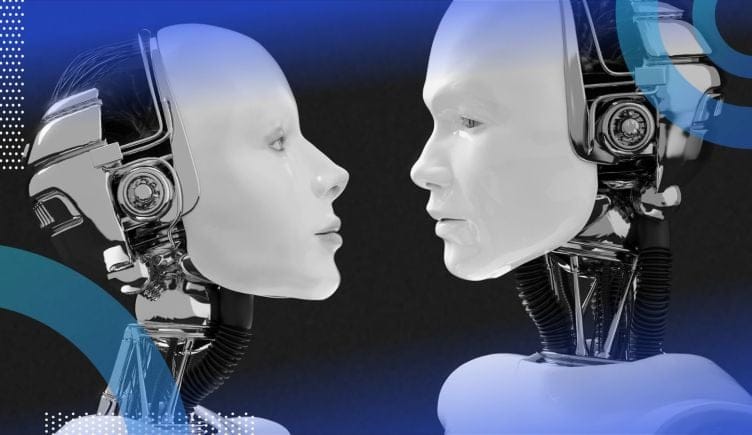
Image: Shutterstock / Built In
In 2010, New Jersey–based company True Companion claimed to be developing robots — a “female” named Roxxxy and a “male” named Rocky — that would, the company promised, “always be turned on and ready to play.” Each bot would be customizable, allowing the buyer to choose the bot’s skin color, facial structure, hair color, and personality — at the price tag of $10,000.
Despite a lot of buzz and promise, no one actually owned a Roxxxy, and by 2021 the company appeared to be defunct, its website a dead link.
What Is Sex Tech?
As robot designers continue to spend a great deal of energy describing a future with a perfect sexual partner, the controversial market for sex robots has been growing. If you visit the annual robotics convention in Las Vegas, you’ll discover large areas of the showroom devoted to sex robots. Right now, they are mostly inanimate dolls, with the voice capabilities of a chatbot, some body sensors that respond and are warm to touch, an artificial heartbeat and middle-of-the-road mechanical mobility.
Despite all the media hype, policy debates, cinematic visions and academic musings, sex robots are still quite primitive. But while many humans eagerly await a truly autonomous sex robot, controversy abounds.
Understanding the Controversy Surrounding Sex Robots
In 2018, an ambitious Canadian company sought to bring its sex robot business venture to the United States, with plans to open a Texas store in which you could buy and rent sex robots. Texans resisted this venture, putting together a petition with thousands of signatories to ban such a store, asserting that it would be akin to sex trafficking and prostitution.
Sex robots create strange bedfellows, with religious conservatives and radical feminists joining together in protest. The arguments against sex with robots run the gamut from fears of sexual liberation to concerns over equality and submission.
Canadian attorney Sinziana Gutiu is a vocal opponent of sex robots, which she views as physical, interactive manifestations of women programmed into submission. She warns that because robots are incapable of saying no, sex bots will inspire men to rape women. Across the pond, anthropologist Kathleen Richardson has been sounding similar alarms. She launched the “Campaign Against Sex Robots” in the United Kingdom, calling for a sex robot ban.
When I listen to these arguments against sex robots, I’m reminded of earlier activists who fought against pornography and sex work. The shared argument made in each of these charged areas is that their existence legitimizes objectification in human-human relations and normalizes the treatment of women, and disproportionately so women of color, as playthings to be sold and exploited for male pleasure.
In a reality still pervaded by deep gender and racial inequalities, it is hard to argue with these fears. Technology receives meaning and purpose within a social and historical context. But as with sex work and pornography, as well as with other controversies around technology, the issues and realities are far more complex than are captured by a campaign to ban them, and they won’t be addressed by sweeping them under the surface.
More on AIThe Future of AI: How Artificial Intelligence Will Change the World
Can a Sex Robot Give Consent?
Is consent between a robot and a human even possible? Some answer yes, if the robotics community designs robots in a way that rejects rape culture and makes consent an active and visible component in their design.
“Allowing people to live out their darkest fantasies with sex robots could have a pernicious effect on society and societal norms and create more danger for the vulnerable.”
One design approach would be a robot that can switch off when a process mimicking consent is not followed, shutting down and refusing to engage. The Foundation for Responsible Robotics warns that “allowing people to live out their darkest fantasies with sex robots could have a pernicious effect on society and societal norms and create more danger for the vulnerable.” The report suggests that sensors could be added to detect violent handling of the robot that imitates abuse.
Others see consent as more subtle and complex. When I was growing up, we were taught that “no means no.” But now we rightly teach our kids that “yes means yes.” Passive compliance does not equal consent. Robots programmed to grant consent defy meaningful consent; consent should be affirmative. If we think that autonomy and consent are inseparable, then until a robot is truly autonomous in its decision-making, it cannot truly grant consent.
These questions are not easy to answer. But these are the conversations we should actively be having because sex tech is here, and whether we like it or not, sex robots are likely to increasingly be normalized in our culture.
Enjoying This Excerpt? Check Out the Book.The Equality Machine: Harnessing Digital Technology for a Brighter, More Inclusive Future
Possible Benefits of Sex Robots
We need more, not less, serious engagement — including rigorous theoretical and empirical study — with the possibility that robots might impact our sexual relations just as they are increasingly transforming the ways we work and relate to each other in other spheres of life.
Sex bot proponents suggest that they could help those who are unable, due to circumstances or a physical or emotional disability, to find regular human companionship.
The Covid-19 pandemic demonstrated starkly how socially isolated we can become, and the mental health problems that can ensue. The loneliness and isolation of a global pandemic offer a poignant use case for the value of having robots (sexual and otherwise) in our homes.

Another possible benefit of sex robots is a safer sex industry. It’s an empirical question, like many of the other envisioned benefits, whether sex robots would indeed help reduce trafficking and protect against diseases and other negative consequences of prostitution. Proponents say that the advantages are obvious: the robots can’t carry sexually transmitted infections and are not trafficked or forced into sex.
While medical researchers debate whether sex bots really do provide safer sex, it is reasonable to expect that if clearly outlined cleaning protocols are established and the right bacteria-resistant materials are used, then robots could provide safer sexual experiences. And if sex bots become a desirable substitute for humans, perhaps their availability could help address the insurmountable tragedy of the millions of women trafficked every year.
Challenging Gender Bias in Sex Tech
We also need to talk about the robust sex tech industry, which merges online and offline tech and is using AI to upgrade the human experience.
The sex tech industry is currently worth $30 billion a year, but it is still geared toward male customers. Fighting a double standard in the industry, women-owned companies in the space point out glaring disparities. In 2016, Polly Rodriguez, CEO and co-founder of the sexual wellness company Unbound, and self-described pleasure strategist Lidia Bonilla co-founded Women of Sex Tech in New York, defining the venture as a female-led women’s sexuality movement. In 2016, King’s College professor Kate Devlin founded the United Kingdom’s first Sex Tech Hackathon.
[Kate] Devlin imagines sex tech providing shapes that are abstract and go beyond the gendered binary human form: “five breasts, three penises, twenty arms.” She imagines a robot that is more abstract, soft and sinuous.
Tech gives us a place to reject the spectrum of possibilities that existed before it. It enables expansion and re-imagination of our sexual pleasure. Devlin imagines sex tech providing shapes that are abstract and go beyond the gendered binary human form: “five breasts, three penises, twenty arms.” She imagines a robot that is more abstract, soft and sinuous.
We already have technology that can read our physical responses, heart rate, muscle movement, skin reactions, facial expressions and eye movements. Sex tech can leverage all this data instantaneously, with machine learning uncovering what makes and keeps each of us aroused, what brings us exhilaration and even what doesn’t.
This means that sex tech doesn’t have to be embodied in any physical form. The rapid development of virtual reality technology, including haptic technologies that replicate and transmit touch sensation, might mean that one day, we might not even need a physical robot (or human) companion.
It also means that we need to think about digital privacy concerns in this frontier like others we explored. Sarah Jamie Lewis, executive director at the Open Privacy Research Society, agrees that sex tech is the future, but warns that smart dildos and vibrators are vulnerable to hacking, just like other devices that collect data about our activities.
And again, the best iterations are sex innovations that enhance rather than replace human relationships. Sex tech can help each of us expand the possibilities of our sexuality and deepen intimacy between us.
More on AIAI Ethics: A Guide to Ethical AI
Continuing the Conversation Around Sex Tech and Robots
As technology in the industrial revolution began to shift women’s roles in the home, introduction of sex robots into our lives might further change how we think about intimacy. It may lead to more acceptance of non-exclusive and non-monogamous relationships.
Sex tech and sex robots can be designed and programmed in ways that embrace diversity and embody the principles of equality and empowerment. The continuing debate around sex bots is complicated and nuanced. The debates are uncomfortable. There are risks and huge flaws, misogyny and stereotypes.
But there is logic and good that come with some of these advancements, so the best that we can do is to carve pathways that support a positive introduction of robots rather than sweeping generalizations, assumptions and overly simple bans. It is happening, the robot revolution, and we can do better.
***
This article has been excerpted from The Equality Machine: Harnessing Digital Technology for a Brighter, More Inclusive Future. Copyright © 2022. Published by PublicAffairs, an imprint of Perseus Books, LLC, a subsidiary of Hachette Book Group, Inc.
If the website content violates your rights, please contact us to delete it。








